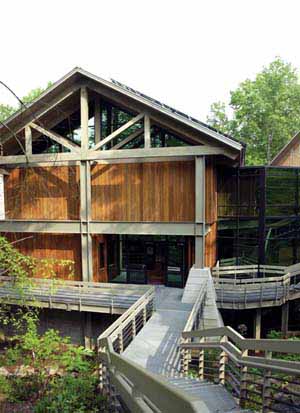|
Community
Profile
Right: The architecturally-striking Center
for the Environment at Catawba College.
Catawba College's New
President
Sees Knowledge in Small Places
When
Dr. Robert Knott took office as Catawba College’s 19th president on
June 1, he accepted the challenge of running a private, diversified college rich
in history yet geared for the future.
Nowhere is that vision more evident than in the school’s Center for the
Environment, a 21,000-square-foot building that reflects the spirit of
Catawba’s Environmental Science/Studies Program and has emerged as an exciting
teaching tool as well as an environmentally sound project.
Nestled on the edge of the college’s 189-acre preserve, the center merges
seamlessly with the natural environment. Catawba’s news services office
proudly notes that everything about the facility — from the site design to the
environmentally friendly building materials, from energy and water conservation
issues to recycling and waste management — is grounded in principles of
sustainability. As an example, Catawba students implemented a waste reduction
plan that recycled more than 86 percent of the construction waste.
Such forward thinking isn’t a surprise on a campus that draws a mix of
students from all over the East Coast and more than 20 foreign countries. This
fall, the campus welcomed about 400 new students, bringing total enrollment to
roughly 1,600.
A question that needs to be answered, says Knott, is to determine the optimum
size for Catawba. “There is always a temptation to grow a little bit,” he
says, while noting that the campus is bounded by an ecological preserve and
residential neighborhoods.
He oversees a faculty of 78 full-time instructors and 35 part-time instructors.
Including staff, the college employs about 250 people. Knott, who was provost at
Catawba from 1982-89, succeeded Fred Corriher, who retired after serving as
president for 10 years. A Wake Forest University graduate, Knott came to
Salisbury from Mars Hill College, where he had been chancellor since
1999. Prior to that, he served 10 years as president of Tusculum College in
Tennessee..
Knott says he enjoys being on small campuses where he can get to know students
as well as faculty and staff. He wants to meet with everyone, he says, from the
Alpha Chi honor society members to the maintenance and custodial staff. “They
are part of educating students, too,” he says. Resident advisers in
particular, he says, have a difficult task. “They represent the campus, yet
they are still students,” he says.
The Winston-Salem native is teaching a class this fall, something he has tried
to do throughout his career.
His dedication to education is evident in a large jar of pebbles that he keeps
on his desk. They represent pebbles of knowledge, he says, and a professor
cannot give these pebbles to a student; rather, the student must earn them
through his or her attitude and desire to learn. — Susan Shinn
Return to magazine index
|